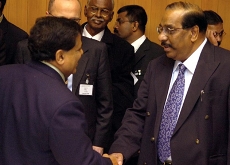
Swiss to host second round of Sri Lanka talks

The Sri Lankan government and Tamil Tiger rebels have agreed to meet again in Switzerland in April after two days of tough but successful talks in Geneva.
Both sides also pledged to respect a fragile four-year-old ceasefire and to take “all necessary measures” to stop acts of violence, abductions and killings.
Swiss diplomats who hosted the talks welcomed the positive outcome, which was announced late on Thursday at a secluded chateau outside Geneva.
“We welcome especially the agreement found on ways of bringing down the level of violence, abductions and killings,” Swiss ambassador to Sri Lanka Bernardino Regazzoni told swissinfo.
“We expect that in the coming weeks the situation on the ground will improve even beyond the levels reached in past weeks, and we are ready to consider positively the request from both parties to host the next round of talks.”
The meeting between representatives of the Sri Lankan government and the Liberation Tigers of Tamil Eelam (LTTE) – the first in almost three years – was convened by Norwegian mediators to prevent the country sliding back into civil war.
Up to 200 people died in an upsurge of violence following the presidential election in November.
Ceasefire commitment
Norwegian mediator Erik Solheim, who claimed the outcome of the talks was above his expectations, said there was now a clear commitment from both sides to make the ceasefire work.
“It shows the confidence that has been built during these discussions,” he said. The two sides will meet again in Geneva on April 19-21.
According to diplomats, failure to make progress would likely have resulted in a return to a three-decade war that has seen up to 64,000 people killed. A ceasefire was signed in 2002 but both sides have accused each other of multiple violations.
Ahead of the talks, the Tamil Tigers – who want a separate homeland in the north and east of the country – said they wanted the government to rein in paramilitary groups. The government in turn threatened to tighten the ceasefire conditions.
But in a joint statement on Thursday both sides agreed to respect the ceasefire and stop all forms of violence.
Further progress
The leader of the Sri Lankan delegation, health minister Nimal Siripala de Silva, said he was confident that further progress could be made.
“We are quite aware that the path to peace is challenging – it’s not a cheap and easy commodity that can be bought over the counter,” he said.
“But we are happy and more confident that in the next round of discussions we should be able to tackle the very difficult issues that are before us,” he said.
The newfound sense of optimism was echoed by Anton Balasingham, chief negotiator for the LTTE, who said strict instructions would be issued to area commanders not to attack the Sri Lankan army. He added that the Tigers would refrain from recruiting underage children.
“It’s up to both sides to ensure there is no more violence and killing,” he said. “We are deeply pleased that the government has agreed to the smooth implementation of the truce agreement.”
swissinfo, Adam Beaumont in Geneva
The Tamil Tigers want autonomy for minority Tamils in the north and east.
The Sinhalese government does not accept a separate state for the Tamils, but says it would consider sharing power.
More than 35,000 Tamils live in Switzerland.
The talks were held in Switzerland following an approach by the Norwegians, who brokered a ceasefire between the Sri Lankan government and the Tamil Tigers in 2002.
Switzerland supports the Oslo Declaration of December 2002 when the Sri Lankan government and the LTTE agreed “to explore a solution founded on the principle of internal self-determination in areas of historical habitation of the Tamil-speaking peoples, based on a federal structure within a united Sri Lanka”.
Delegations from the Sri Lankan government and the LTTE have visited Switzerland to study its federal model.

In compliance with the JTI standards
More: SWI swissinfo.ch certified by the Journalism Trust Initiative















![The four-metre-long painting "Sonntag der Bergbauern" [Sunday of the Mountain Farmers, 1923-24/26] had to be removed by a crane from the German Chancellery in Berlin for the exhibition in Bern.](https://www.swissinfo.ch/content/wp-content/uploads/sites/13/2025/12/01_Pressebild_KirchnerxKirchner.jpg?ver=a45b19f3)













You can find an overview of ongoing debates with our journalists here . Please join us!
If you want to start a conversation about a topic raised in this article or want to report factual errors, email us at english@swissinfo.ch.